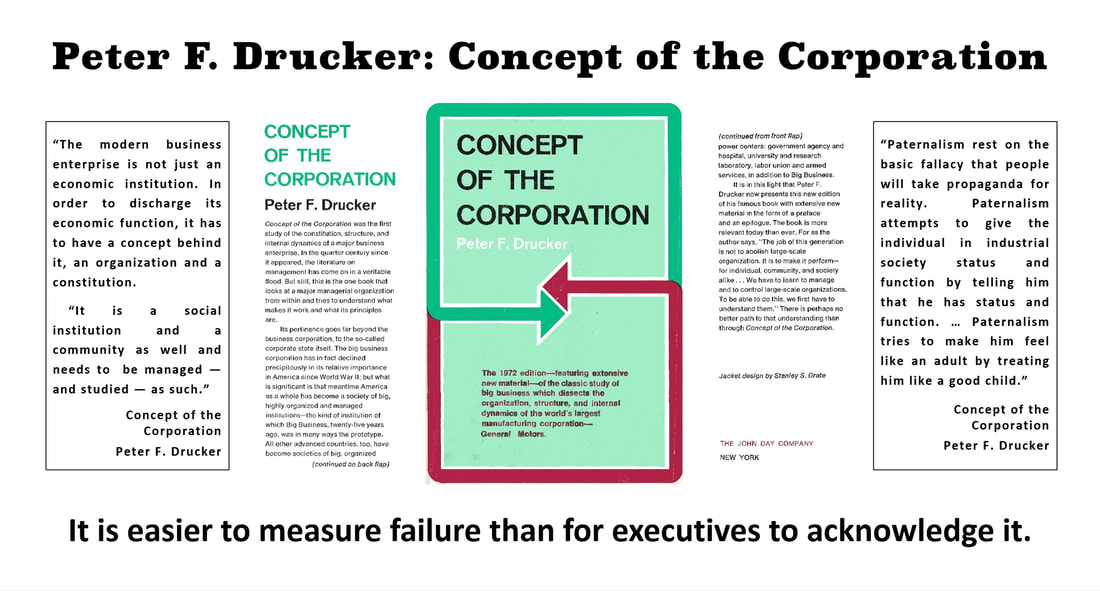Timeless Management Principles:
The Thoughts of Peter F. Ducker Put into Action by Thomas J. Watson Sr.
This website provides Peter F. Drucker's insights into management. It then aligns his thoughts with Thomas J. Watson Sr.'s business and management actions and practices. This site positions a "concept" put forward by the great management philosopher of his day and matches it with the "words and practices" of one of America's greatest industrialists: Tom Watson Sr.
Peter F. Drucker's Opinion of Thomas J. Watson Sr.
Peter F. Drucker interviewed Tom Watson on several occasions. He wrote the following of the traditional founder of IBM.
Thomas J. Watson Sr.—and this, I think, makes the man singularly interesting—was a uniquely American type and one the Establishment has never understood throughout our history. He was possessed of a towering intellect but was totally non-intellectual. He belongs to the same type as Abraham Lincoln, who similarly offended the establishment of his day: the cosmopolitan, polished, learned Bostonians who considered themselves so superior to the yokel President in whose Cabinet they were forced to serve. …
This American type is totally native and owes nothing to Europe—which is one reason why the intellectuals of his time do not know what to do with him. Typically the men of this type have a gift for words, and Watson fully shared it. But they are not men of ideas. They are men of vision. What makes them important is that, like Watson, they act on their vision.
That he did so, made Watson one of the Americans of his generation who did make a difference.
Peter F. Drucker, "Thomas Watson's Principles of Modern Management," Esquire, December 1983
Yep, Tom was my kind of guy.
Combining Management Insight with Leadership Action
Select a concept button on the left or select the following from the website menu:
- "20th Century IBM" -> "Thomas J. Watson Sr." -> "Slice of Life Stories" -> "Peter F. Drucker."
|
"The purpose of such a concept [a constitution] is never to serve as a rigid rule. Rather it is to be used like a compass bearing taken across rugged mountains."
|
|
"[Any large scale organization] must make it clear to each supervisor and manager that the training and development of subordinates is a part of his [or her] duties."
|
|
"Most of us . . . fail to understand that modern production . . . is based on . . . principles of organization—organization not of machines but of human beings."
|
|
"Any conflict between short-term results and long-term growth . . . is not primarily a disagreement on economics. It is fundamentally a value conflict."
|
|
"The essence of the corporation is social . . . for far too many people, the essential in modern industrial production is not the social organization but raw materials or tools."
|
|
"In a functioning society, power is exercised as authority, and authority is the rule of right over might. But only a legitimate power can have authority."
|
|
"Two attempts have been made so far to solve the problems of industrial citizenship: industrial paternalism and industrial unionism. Both have failed."
|
|
"It is the right as well as the duty of every managerial employee to criticize a central management decision which he considers mistaken or ill advised."
|
|
"It is a law of nature that two moving bodies in contact with each other always create friction. . . . manners are the lubricating oil that enable these bodies to work together."
|
|
"Fundamentally, American political philosophy stands on the Christian basis of the uniqueness of the individual."
|
